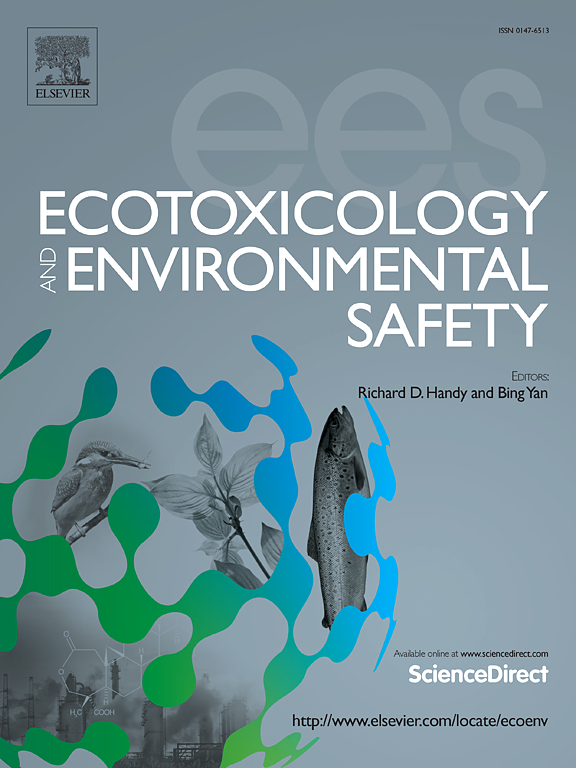Metal-organic framework nanomaterials alter cellular metabolism in bladder cancer
IF 6.1
2区 环境科学与生态学
Q1 ENVIRONMENTAL SCIENCES
引用次数: 0
Abstract
While nanomaterial-mediated metabolic reprogramming emerges as a promising anticancer strategy, the precise mechanisms remain elusive due to limited metabolomics investigations. The objective of this study is to design an aluminum (Al) based metal organic frameworks (Al-MOF) and investigate its cytotoxic effects on bladder cancer cells (T24), and elucidate the specific molecular mechanisms. Comprehensive characterization (scanning electron microscopy, particle size and potential analysis, infrared spectroscopy, powder X-ray diffraction, and N2 desorption/desorption experiment) confirmed the successful preparation of Al-MOF. Subsequently, in vitro assays demonstrated the selective cytotoxicity of Al-MOF, showing an inhibitory effect on the proliferation of T24 compared to human immortalized urothelial cells. At the same time, when the concentration of Al-MOF exceeded 100 μg/mL, it exhibited significant migration inhibition on T24. Then, the effect of Al-MOF on T24 metabolites was investigated using ultra-high performance liquid chromatography quadrupole Orbitrap high-resolution mass spectrometry. After 24 h of incubation, we identified 38 key differential metabolites from expression patterns and metabolic pathways, predominantly in fatty acid synthesis. Research has found that Al-MOF reduced fatty acid biosynthesis by inhibiting FASN expression, thereby inhibiting the progression of T24. This work provides evidence of MOF-mediated intervention in cancer cell metabolism, offering valuable insights for the design of novel multifunctional nanotherapies.
金属-有机框架纳米材料改变膀胱癌细胞代谢
虽然纳米材料介导的代谢重编程作为一种很有前景的抗癌策略出现,但由于代谢组学研究有限,其精确机制仍然难以捉摸。本研究旨在设计一种铝基金属有机骨架(Al- mof),研究其对膀胱癌细胞(T24)的细胞毒作用,并阐明其具体的分子机制。综合表征(扫描电镜、粒度及电势分析、红外光谱、粉末x射线衍射、N2脱附/脱附实验)证实了Al-MOF的成功制备。随后,体外实验证明了Al-MOF的选择性细胞毒性,与人永生化尿路上皮细胞相比,它对T24的增殖有抑制作用。同时,当Al-MOF浓度超过100 μg/mL时,对T24有明显的迁移抑制作用。利用超高效液相色谱四极杆轨道阱高分辨率质谱分析了Al-MOF对T24代谢产物的影响。经过24 h的孵育,我们从表达模式和代谢途径中鉴定出38个关键的差异代谢物,主要是脂肪酸合成。研究发现Al-MOF通过抑制FASN表达来减少脂肪酸的生物合成,从而抑制T24的进展。这项工作为mof介导的癌细胞代谢干预提供了证据,为设计新型多功能纳米疗法提供了有价值的见解。
本文章由计算机程序翻译,如有差异,请以英文原文为准。
求助全文
约1分钟内获得全文
求助全文
来源期刊
CiteScore
12.10
自引率
5.90%
发文量
1234
审稿时长
88 days
期刊介绍:
Ecotoxicology and Environmental Safety is a multi-disciplinary journal that focuses on understanding the exposure and effects of environmental contamination on organisms including human health. The scope of the journal covers three main themes. The topics within these themes, indicated below, include (but are not limited to) the following: Ecotoxicology、Environmental Chemistry、Environmental Safety etc.

 求助内容:
求助内容: 应助结果提醒方式:
应助结果提醒方式:


